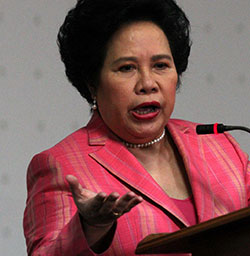Trends of the week
MANILA, Philippines - This week in Twitter: America is out of the World Cup, a new rapper feud is brewing, hazing apparently is still a thing, and a beloved senator battles cancer. Let’s recap the week that was in the buzzing halls of social media
Hazing is still happening and is still not cool
The consensus on Twitter is clear: Hazing is an archaic and barbaric practice that doesn’t belong in the 21st century. But how archaic can it really be when we’re still decrying its existence in a technological medium that is as 21st century as EDM?
Hazing was brought back to the public consciousness this week after College of Saint Benilde sophomore Guillo Servando died of hazing-related injuries caused by members of the Tau Gamma Phi fraternity. The concept of gauging loyalty and toughness in artificial, if totally absurd, conditions never made sense, but it somehow seemed cool in decades past when the avenues for connection and group inclusion were, relatively speaking, limited. I cannot imagine how it can still hold any appeal in this age when kids can achieve bonds with like-minded strangers just by typing a few letters on a keyboard. Fraternity and brotherhood are ideas useful in the hostile battlefield, not in the increasingly fragmented youth culture that offers a niche for almost every type of person: geek, jock, freak, entrepreneur, fashion blogger, and certainly an HRIM major. What holds currency these days is connection. The only real risk anyone should be willing to take is rejection.
We’ve been condemning hazing for decades, but this is the first incident where we are finally armed with something as sweeping and powerful as social media. The hope is that we can shame these kids into eliminating hazing using their own viral technology.
Twitter consoles Miriam Santiago
#MiriamFight was Twitter’s top-trending reaction to news of its all-time favorite senator and leading supplier of senatorial comedy, snark and bombastic quotes being diagnosed with Stage 4 lung cancer. Many on Twitter apparently have still not fully recovered from The Fault In Our Stars, because there have been tweets comparing Senator Miriam Santiago to the movie’s cancer-stricken heroine, Hazel Grace. The parallelism isn’t totally off because social media is in love with Miriam, and it’s more than willing to be her Augustus Waters.
Sen. Santiago is widely perceived to be the best senator in the country because she comes off as the most honest, most fearless, and most intelligent. Whether or not this is true is up for eternal debate, but what is virtually inarguable is that she is the most unique. For instance, no one batted an eyelash when she herself tweeted the #MiriamFight hashtag and achieved a new level of Illeism in the process. Who else gets away with that?
Miriam Santiago is the perfect politician for the social media age because she is effortlessly hilarious and is always as incredulous as we are at the idiocies of the government. Some people believe her completely, some hope that she is exactly what she trumps herself to be, but now everyone just hopes she gets well soon. #MiriamFight. The Internet needs you.
America bids farewell to its quadrennial sports fling
 As American Twitter desperately tried to will its World Cup team to a comeback against Belgium in the wee hours of Wednesday morning (Manila time), the nation’s relationship with football came full-circle. “Soccer,” as the sport is condescendingly known in the US, is mostly a game played by sons and daughters who aren’t good enough to play red-blooded American sports (“real sports”) like baseball, basketball, and American football. Hence the pejorative term “soccer moms,” referring to all those overbearing parents who hate to see their children fail.
As American Twitter desperately tried to will its World Cup team to a comeback against Belgium in the wee hours of Wednesday morning (Manila time), the nation’s relationship with football came full-circle. “Soccer,” as the sport is condescendingly known in the US, is mostly a game played by sons and daughters who aren’t good enough to play red-blooded American sports (“real sports”) like baseball, basketball, and American football. Hence the pejorative term “soccer moms,” referring to all those overbearing parents who hate to see their children fail.
Oh, how America’s children failed this week.
It was adorable to see Americans root for the USA Men’s Soccer Team on Twitter like a bunch of overbearing parents over the past few weeks, their general indifference to the sport overridden by their patriotic excitement over the fact that they are finally an underdog in something. On Wednesday, the experience was golden. When Team USA was down 2-0, American Twitter was in full white-knuckle mode, with someone even tweeting: “It’s desperation time — USE YOUR HANDS!” After the referees gave the Americans a measly one minute of stoppage time, my timeline read like this:
“One minute? That’s it?”
“What an awful sport!”
“One minute??? Is the referee the Nobel Prize committee?”
When it was all over, there was so much sadness, but not for long. Perhaps instantly reminded of how little soccer mattered to them, Americans got over the loss pretty quickly, with someone even tweeting “Soccer is dead. Long live football.” That’s right: American football season starts in a couple of months. Americans will care about American things again.
This probably comes as a huge relief to infamous conservative pundit Ann Coulter who successfully drew attention anew with her anti-soccer column that had as much sophistication as a fifth grade theme-writing assignment. Soccer is for the weak, she claims, because it does not lend itself to individual blame or glory. While she clearly needs more research, or even just a cup of coffee with, say, perennial English football goat John Terry and eternal Brazilian hero Pelé, the existence of her column, the mere existence of Coulter, herself, is just so hilariously American. Inside her head is a little world, completely insulated from the diversity of her country, let alone the rest of the world.
As for the other hundreds of thousands of Americans who followed their national team, who made #IBelieveThatWeWillWin trend, who vowed to buy goalkeeper Tim Howard a drink when they see him, they were able to discover something greater than “what the fuss is all about”: universal joy and pain. For a few weeks, they could relate to the world, and the world could relate to them. Soccer isn’t for the weak — it only makes America look weak and therefore more endearing.
* * *
Tweet the author @ColonialMental
Rap feuds ain’t what they used to be
“When you hear Nicki Minaj spit, Nicki Minaj wrote it,” boasted Minaj during the BET (Black Entertainment Television) Awards, causing a minor ruckus on social media this week. It was an alleged thinly-veiled dig at rapper Iggy Azalea who is allegedly employing ghostwriters for her songs, which doesn’t come as much of a shock from a white, Aussie rapper who’s built a career on an affected black southern accent. “I hope and pray that BET continues to honor authenticity,” Minaj concluded.
The towering factory of irony that is Twitter immediately called BS on this statement, reminding everyone that Minaj herself is a mere clone of rapper Li’l Kim. In fact, Twitter was generally unenthusiastic in pitting Azalea against Minaj. Their names trended together mainly because of people arguing against comparing them. In this cut-and-paste, pin-and-tag world, authenticity no longer seems to be the noble cause that it once was. As hip-hop drummer and producer Questlove contends in his terrific “How Hip-Hop Failed Black Amercia” essay series for Vulture.com, authenticity in rap has long been rendered meaningless, not only by posturing white performers, but even by black artists themselves. “Today’s hip-hop stars may be the Federal Reserve of black cultural cachet,” he wrote, “but these days they’re just printing money whose value has long ago diminished.”
At this point in hip-hop, when the genre has become normative and no longer capable of making the African-American-specific statements of yore, a white rapper and a black rapper are basically both parrots. Authenticity, as this generation seems to have quickly figured out, is no longer a question, let alone a cause worth fighting for. This certainly isn’t the kind of feud Twitter is looking for.















